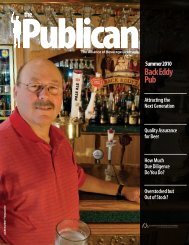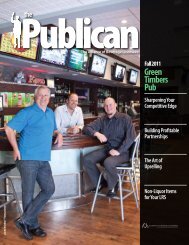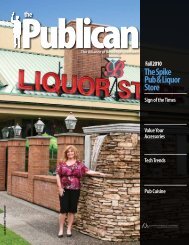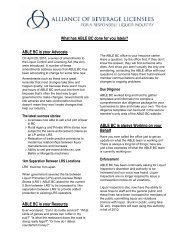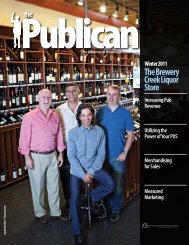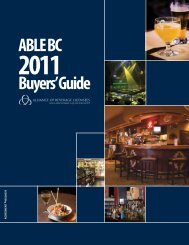Here - ABLE BC
Here - ABLE BC
Here - ABLE BC
You also want an ePaper? Increase the reach of your titles
YUMPU automatically turns print PDFs into web optimized ePapers that Google loves.
Police Practices and Impaired Driving<br />
under the Automatic Roadside<br />
Prohibition Regime<br />
by Shea Coulson<br />
Since September 20, 2010, the provincial<br />
government’s Automatic Roadside Prohibition<br />
regime (ARP regime) has imposed penalties<br />
for drivers who blow above 0.05 blood alcohol<br />
content into an Approved Screening Device (ASD)<br />
administered at the roadside. The ARP regime<br />
has dramatically altered the landscape for liquor<br />
licensees in the province, both in terms of the<br />
law itself and police practices enforcing the law.<br />
On November 30, 2011, the <strong>BC</strong> Supreme Court<br />
struck down the portion of the ARP regime dealing<br />
with drivers blowing over 0.08 blood alcohol,<br />
but upheld the remainder of the ARP regime.<br />
This decision, which is known as Sivia v. British<br />
Columbia (Superintendent of Motor Vehicles), is<br />
now under appeal to the <strong>BC</strong> Court of Appeal. In<br />
the meantime, the provincial government has<br />
amended the ARP regime to address the Supreme<br />
Court’s concerns and the ARP regime remains in<br />
force. However, if the appeal is successful, the<br />
entire ARP regime will be struck down and the<br />
government will have to reconsider its approach<br />
from scratch.<br />
Given the outstanding appeal, the full ramifications<br />
of the ARP regime have not yet been realized as the<br />
government awaits the Court of Appeal’s ruling.<br />
Despite this, there are already early indicators of<br />
changing police practices. Some licensees have<br />
reported that police officers are “camping out” in<br />
licensee parking lots, waiting to administer the<br />
roadside ASD on patrons exiting<br />
the establishment. In some cases,<br />
police are allegedly sitting in pub<br />
parking lots during the day as well<br />
as at closing time. Licensees have<br />
expressed concern that these<br />
police practices may deter patrons<br />
from their businesses. Licensees<br />
are rightly asking whether there<br />
is a legal solution to this dilemma.<br />
The police operate with a broad discretion to<br />
enforce the law, including the ARP regime. As<br />
such, barring highly arbitrary actions that directly<br />
harm the licensee, there is little that licensees can<br />
do legally to change police practices. Further,<br />
with respect to the driver, so long as the police<br />
form a reasonable suspicion that an individual<br />
has been consuming alcohol, they are entitled<br />
to administer the roadside ASD test. In most<br />
cases, it is likely that a police officer’s observation<br />
of an individual entering a pub or bar for a<br />
reasonable period of time and then leaving in a<br />
car constitutes reasonable suspicion. Even if not,<br />
the ARP regime leaves virtually no room to raise<br />
the issue. Any such argument would have to be<br />
made on a driver-by-driver basis.<br />
The outcome of the Sivia appeal will therefore<br />
have the most significant impact on police<br />
practices enforcing impaired driving laws. If the<br />
appeal is successful, then the ARP regime will<br />
be invalid and police will return to using the old<br />
Automatic Driving Prohibition regime, which<br />
only contains penalties for drivers above 0.08%<br />
blood alcohol content and requires police to test<br />
drivers at a police station using the breathalyser<br />
device. These requirements will very likely render<br />
the police parking lot “camp out” impractical and<br />
curb the practice.<br />
However, if the Sivia appeal is unsuccessful, then<br />
the “camp out” practice is likely to continue. The<br />
best resort for licensees is therefore to construct<br />
a due diligence regime to prevent patrons who<br />
may be impaired from leaving the establishment<br />
with the intention to drive.<br />
Shea Coulson is a civil litigator at Gudmundseth Mickelson LLP with<br />
expertise in liquor licensing and liquor distribution law, and is cocounsel<br />
with Howard Mickelson, Q.C. on the Sivia appeal challenging the<br />
constitutionality of the ARP regime.<br />
The Publican<br />
25



